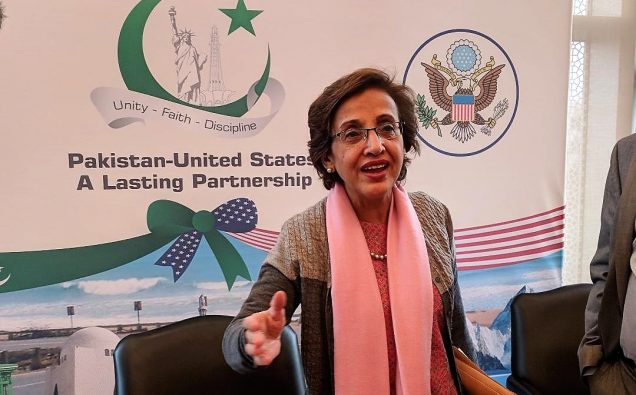
Pakistan’s top career diplomat Tehmina Janjua on Thursday renewed her country’s demand that the U.S.-Pakistan Strategic Dialogue be revived to advance bilateral cooperation in wide-ranging areas as the two countries attempt to overcome trust deficit in the relationship.
Foreign Secretary Janjua underscored Pakistan’s commitment to peace and stability in Afghanistan but said the U.S.-Pakistan relationship should not be confined to just cooperation toward resolving the Afghanistan conflict.
“Our bilateral relationship is not just about Afghanistan, we have a history of cooperation in several fields, and we have asked the United States to restart the structured strategic dialogue,” Janja told Washington-based Pakistani journalists.
The U.S.-Pakistan strategic dialogue, before it was suspended a few years ago, focused on cooperation in security, economic, trade, education, science and technology, democratic development and several other areas.
During her ongoing visit, Janjua has met senior U.S. State Department officials, continuing diplomatic engagement between the two countries on mutual concerns and effective cooperation.
According to the Pakistani embassy, the recent high-level exchanges between the two countries are meant to better understand each other’s perspectives.
Pakistan, she said, welcomes Afghan President Ashraf Ghani’s offer of peace talks to the Afghan Taliban. However, Janjua said, any peace process in Afghanistan has to be Afghan-owned and Afghan-led.
For its part, Pakistan has taken steps to check cross-border movement of militants who exploit the porous border for their illegal movement.
“The end objective of both Pakistan and the United States is the same – peace and stability in Afghanistan. The modalities can be different so both sides are meeting frequently to find common grounds,” Janjua said.
Islamabad, which has deployed more than 150,000 troops along the Afghan border, is pursuing border management project, which is expected to be completed in a few years.
Additionally, Pakistan is also pushing the Afghan Haqqani militants out of its territory as it believes that they are Afghans and should be in Afghanistan. The career diplomat also noted that Pakistan’s influence over the Taliban has eroded and remarked there are several countries that have direct contacts with the Afghan Taliban.
Janjua dispelled the impression that Pakistan was doing America’s bidding in fighting terrorists. “Whatever actions we are taking are in Pakistan’s national security interest,” she said referring to the National Action Plan that came into being after 2014 terror attack on Army Public School in Peshawar.
Speaking about threats facing Pakistan, the foreign secretary said Pakistan has long conveyed to the United States its concern over the anti-Pakistan TTP militants being able to have a sanctuary on the Afghan side and perpetrate attacks inside Pakistan.
Yet, the TTP is one of the concerns, she said, citing India’s involvement in financing terror attacks in Balochistan as revealed by an Indian spy in Pakistan custody. She said India uses Afghan soil for state-sponsored terrorism against Pakistan.
“Then there is the threat on the eastern border, where there has been extensive shelling, why are there warlike hostilities on the eastern border,” Janjua said, echoing Pakistani concerns that India wants to hurt and destabilize Pakistan from both the eastern and western borders.















